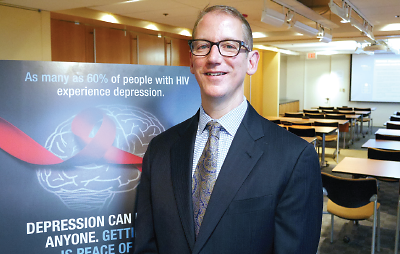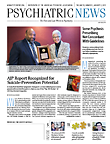Though diagnosis of an HIV infection or AIDS is not the death sentence that it was more than 25 years ago, some experts say that the United States still has a long road ahead to reduce the rate of new infections and provide adequate health care to many of the individuals infected with the virus.
Last month, in commemoration of World AIDS Day, the APA Office of HIV Psychiatry sponsored a program on the national strategy to prevent HIV/AIDS in the United States. Jeffrey Crowley, M.P.H., director of the National HIV/AIDS Initiative at Georgetown University and former director of the White House Office of National AIDS Policy, was the guest speaker.
“HIV is not in the front of the news as it was more than 20 years ago,” Crowley said. “We need to update people with the current reality of HIV and what the epidemic looks like today.”
According to Crowley, the incidence of HIV/AIDS in this country is fairly stable, with the Centers for Disease Control and Prevention (CDC) reporting 1.2 million Americans living with the disease in 2011 and approximately 50,000 new cases of infection occurring each year.
The populations that HIV is hitting the hardest are gay and bisexual men of all races, African Americans and Hispanic Americans, and substance users, Crowley said in an interview with Psychiatric News. He stated that though the HIV/AIDS epidemic has been historically concentrated in large Northeastern and West Coast cities, the latest trend is the increase in new infections in Southeastern states. “The South is now bearing a heavy burden of the epidemic, which was not the situation two decades ago.”
Though medical advances have contributed to the drastic drop in HIV-related deaths—from 42,000 in 1995 to 14,000 in 2011—the CDC reports that the virus is under control in only 25 percent of HIV-infected individuals.
“The U.S. does very well in diagnosing the disorder, compared with other countries,” Crowley told Psychiatric News. “The CDC reports that among Americans living with HIV, approximately 86 percent have been diagnosed.” However, he emphasized, “the U.S. is doing a poor job linking people who are newly diagnosed into a system of medical care where the patients will adhere to care.”
During Crowley’s tenure at the White House, he helped develop the National HIV/AIDS Strategy, a plan for stakeholders to address common goals for reducing new infections, increasing access to care, and reducing HIV-related health disparities. One plan of action carried out from the strategy was allocating funds for geographic areas carrying a heavy burden of the epidemic. “Instead of putting more money into the San Francisco Bay Area, we put more funding in the South, where HIV infection rates continue to rise,” he said.
Crowley also said in the interview that the recent changes in health care laws will help to ensure that plans proposed in the HIV/AIDS strategy will come to fruition. “We are trying to make sure everyone with HIV is diagnosed and able to receive treatment as soon as possible. In order to do this, people need to have a source of health coverage. The Affordable Care Act is expanding coverage to lots of people who didn’t have it before. And it will make it easier for people to know their status and receive affordable medical treatment.”
“HIV/AIDS is still a major epidemic in this country, but we are making major progress,” said Crowley, “and even greater goals will be met in the future for further controlling the disease.” ■

